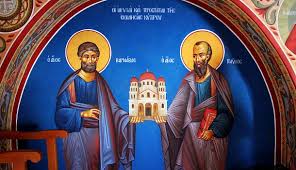HOMILY EASTER SEASON WEEK 05 02 – Year I
Being Missionary Disciples
(Acts 14.19-28; Ps 145; Jn 14.27-31)
************************************************
To announce the release of a new movie, a trailer is often produced giving the viewer an idea of what the movie will be like, enticing viewers to go see the movie.
The readings today are like a trailer describing a whole new way of life as an emerging church, along with an invitation to be missionary disciples.
 In the first reading, Paul and Barnabas travel as missionary disciples from Lystra to Derbe, Pamphlia and Perga. What being a follower of Jesus as Risen Lord entails is revealed as the reading unfolds.
In the first reading, Paul and Barnabas travel as missionary disciples from Lystra to Derbe, Pamphlia and Perga. What being a follower of Jesus as Risen Lord entails is revealed as the reading unfolds.
First, they experience bitter opposition and resistance from the Jews, who should have been the first to recognize and accept Jesus. Instead, they are so afraid of losing money, status, power and control they resort to violence in the name of religion – they stone Paul to the point they thought he was dead.
It seems that from the beginning, believers in Jesus were destined to experience some form of persecution. As the late activist Daniel Berrigan SJ put it, “Before we decide to follow Jesus, we should first consider how good we look on wood!” He could say that with conviction, as he laid his life on the line many times working for social justice and peacefully protesting the war-making of the US government and military-industrial establishment.
The key here is when suffering comes our way, we are to let it be redemptive and connected to the suffering of Jesus by accepting it without bitterness or resentment, as Jesus did. Then we are truly living in the Kingdom. Paul and Barnabas take this persecution in stride, explaining that some suffering is essential to enter the Kingdom of God. This is the bottom line – living in the Kingdom of God here and now, which was Jesus’ favorite topic. This was the “word” and the “good news” that the apostles proclaimed – that Jesus is arisen from the dead, that the Spirit has been given to the early community and that the Kingdom of God is a present reality for those who believe.
The reality of the early Church, or Ecclesia in Greek and Qahal in Hebrew (the people set apart) is mentioned as a matter of course. Already in the earliest days of the proclamation of the word, the disciples were forming themselves into local churches.
Paul and Barnabas not only appointed elders to lead these churches, they also encouraged and strengthened them by their teaching and presence. This continues to this day, as the church, the Body of Christ, the People of God, continues to grow around the world. That is implied by the phrase they “made many disciples.” A disciple is a life-long learner, “mathetas,” someone who tries to be a carbon copy of the master.
The gospel takes us back to the Last Supper, at which Jesus shared intimately with his disciples. Here he bequeaths on them the peace he alone can give, reminds them of the love he has for them and that he and the Father have for each other, and the importance of putting their complete faith and trust in him.
So to sum up, the love of God the Father has been made known to us by Jesus, the Son of God, Risen Lord and Messiah. The gift of the Holy Spirit at Pentecost birthed the early church and molded the fearful and hesitant followers of Jesus into a cadre of missionary disciples who fearlessly proclaimed the “word,” the “good news” to all who would listen, receptive of hostile.
The Eucharist does what St. Paul did for the early believers – it encourages and strengthens us as a church to be missionary disciples, fearlessly proclaiming the good news of salvation in Jesus Christ to the world.



